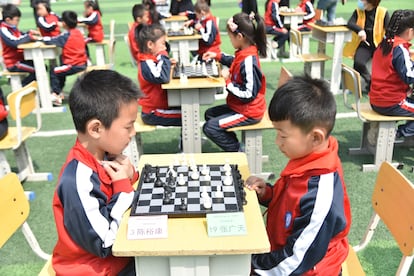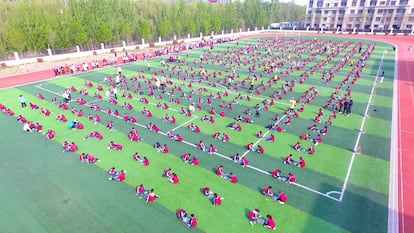Chess was once banned in China. Today, the country wants to win the World Chess Championship
Fifty years ago, during the Cultural Revolution, the authorities in the Asian giant fined players and burned chess books. But today, Liren Ding, who is competing for China, is fighting to become the champion who will succeed Magnus Carlsen, the Norwegian grandmaster


Beethoven’s music, chess and everything that was interpreted as a sign of “decadent capitalism” was banned in China during the Cultural Revolution (1965-1976) — a sociopolitical movement that saw millions arrested and killed during the last years of Mao Zedong’s regime. Today, however, the story is very different. All of China’s state media is covering the 2023 World Chess Championship in Astana, Kazakhstan, where Liren Ding is the first Chinese grandmaster fighting for the world chess championship. And, since 1991, China has won every other title, women’s, junior and team.
Even when Mao was already very ill by the mid-1970s, the police fined street players and searched houses for chess books to burn in public squares. But when Deng Xiaoping took power in the years after Mao’s death, the policy towards chess changed completely. There was even a priority given towards female competition, while the state began preparing players to move from Xiangqi or Chinese chess to the international game.
The success of the new policy was tremendous. Xie Jun — born during the Cultural Revolution — became the women’s world champion in 1991. More strong players soon emerged, breaking the dominance of the Russians and Georgians. Then, men’s chess took off, which resulted in China taking gold at the 2014 Chess Olympiads in Trömso, Norway and 2018 in Batumi, Georgia. Meanwhile, between 1991 and 2018, Chinese children and adolescents — both male and female — won Chess World Cups in all categories: under 8, 10, 12, 14, 16, 18 and 20.
Yet, at the moment, there are no Chinese men among the top hundred in the under 20 category. Tian Hongwei, general secretary of the Chinese Chess Federation, attributes this absence to the pandemic, which was especially harsh in her country, resulting in multiple lockdowns and travel bans. “We also organize a lot of tournaments that don’t count towards the international rankings, because we have so many unranked players,” she adds.
There are “about five million” Chinese citizens registered in the Chess Federation, but there is no doubt that, in the world’s second-most populous country, there are many more aficionados of the game.

The author of this article spent three days in Nanjing in 2019, on the occasion of the under 8 and under 10 national championships. A large part of the thousand participants — the best from each province — were child prodigies. It was normal, for example, that they would spend their time in the elevator (the hotel was a skyscraper) solving math problems on electronic devices. “The level of Chinese children in mathematics, physics and chemistry is very high,” Hongwei confirms.
This has a lot to do with the One-Child Policy, in effect from 1979 to 2015 (today, the limit is two). Many parents are obsessed with the idea that their well-being in old age will depend on the income of their only son or daughter. Therefore, the pressure for children to enter the best schools and universities is often brutal, especially when it comes to entrance exams, which, each year, produce dramatic collective tension in China.
Consequently, everything related to education and developing intelligence is considered to be extremely important. But the country’s meteoric progress creates an obstacle to producing more chess champions: “Before, being a highly competitive chess player was a very attractive way of life, because there weren’t many more tempting professions. Now, there are many options in the fields of science, technology and art. Therefore, it’s more difficult for us to convince our [talented participants] to become professional players,” Hongwei explains.
One of the best examples of this conundrum is Yi Wei, 23, who since he was a child emerged as one of the earliest chess talents in history. “He’s given priority to his university studies, which are ending this year. But he must return to elite chess, because he’s a model for millions of Chinese children,” the general secretary notes.
Chess and Go — an abstract strategy board game, invented in China 2,500 years ago — are two non-Olympic sports with government support comparable to the Olympic Games. “We have two training camps for the national team and the greatest talents, with everything paid for by the government,” Hongwei concludes.
Sign up for our weekly newsletter to get more English-language news coverage from EL PAÍS USA Edition
Tu suscripción se está usando en otro dispositivo
¿Quieres añadir otro usuario a tu suscripción?
Si continúas leyendo en este dispositivo, no se podrá leer en el otro.
FlechaTu suscripción se está usando en otro dispositivo y solo puedes acceder a EL PAÍS desde un dispositivo a la vez.
Si quieres compartir tu cuenta, cambia tu suscripción a la modalidad Premium, así podrás añadir otro usuario. Cada uno accederá con su propia cuenta de email, lo que os permitirá personalizar vuestra experiencia en EL PAÍS.
¿Tienes una suscripción de empresa? Accede aquí para contratar más cuentas.
En el caso de no saber quién está usando tu cuenta, te recomendamos cambiar tu contraseña aquí.
Si decides continuar compartiendo tu cuenta, este mensaje se mostrará en tu dispositivo y en el de la otra persona que está usando tu cuenta de forma indefinida, afectando a tu experiencia de lectura. Puedes consultar aquí los términos y condiciones de la suscripción digital.








































